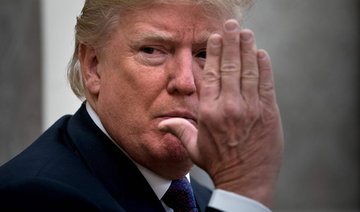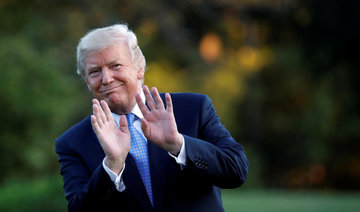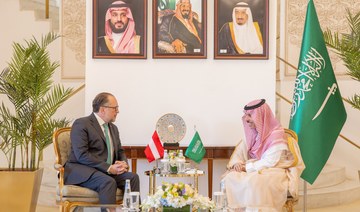WASHINGTON: Republicans in the US House of Representatives will delay the release of long-awaited tax legislation by one day until Thursday, the head of the chamber’s tax-writing panel said late on Tuesday.
“In consultation with President Trump and our leadership team, we have decided to release the bill text on Thursday,” House Ways and Means Committee Chairman Kevin Brady said in a statement.
“We are pleased with the progress we are making and we remain on schedule to take action and approve a bill at our Committee beginning next week,” the Republican lawmaker added.
In a tweet on Tuesday night before Brady’s statement, President Donald Trump said: “The Republican House members are working hard (and late) toward the Massive Tax Cuts that they know you deserve. These will be biggest ever!“
Republicans, who control both chambers of Congress, are looking to tax reform for their first legislative victory since Trump took office in January. Democrats say the Trump tax plan is a giveaway to corporations and the rich.
Two sources with knowledge of the discussions said earlier on Tuesday that the bill, which had been expected on Wednesday, would emerge a day later to give lawmakers additional time to address differences over the tax treatment of retirement savings accounts and a deduction for state and local tax payments.
Trump and other top Republicans have proposed a plan that would cut taxes for corporations, small businesses and individuals by up to $6 trillion over a decade and pay for the reductions in part by eliminating trillions of dollars in deductions and other tax breaks that are often fiercely defended.
The US tax code has not undergone a major overhaul since 1986, when Republican Ronald Reagan was president.
Earlier on Tuesday, House Republicans appeared to be nearing a deal on state and local taxes that would preserve a federal deduction for property taxes but not income taxes, potentially removing a major obstacle.
Republican Representative Tom Reed of New York said the “sweet spot” compromise was gaining support among high-tax state lawmakers who have signaled their opposition to a proposal to repeal the state and local tax, or SALT, deduction.
Another New York Republican saw things differently.
“I’m still inclined to be opposed to it. The income tax is a major factor,” said Representative Peter King.
“This is going to affect our country for the next 20 years, for good or bad. I think the last time we did tax reform, there was like two years of debate. We’re going to have 10 days,” he said.
The SALT compromise would reduce, but not eliminate, a disproportional tax impact on upper middle-class families in high-income tax states such as New York, New Jersey and California. Those states send enough Republicans to Congress to derail a tax bill.
The House bill is expected to cut the top corporate income tax rate to 20 percent from 35 percent and phase out the estate tax paid by the wealthiest taxpayers over two or three years. It may also set a repatriation rate for US businesses with profits overseas, according to a source familiar with a Tuesday meeting between House Speaker Paul Ryan and conservative groups.
It is also likely to set a 15 percent minimum tax on active foreign income of US corporations, according to lobbyists with knowledge of negotiations.
As the Trump administration escalated its pro-tax plan campaign, Vice President Mike Pence met with Republicans on Tuesday, while Trump hosted industry leaders and then Ryan, at the White House.
Trump said at the White House he wanted Congress to pass tax reform bills by the US Thanksgiving holiday on Nov. 23.
A proposal to limit how much money Americans can direct to their 401(k) retirement accounts and individual retirement accounts (IRAs) on a pre-tax basis is meeting resistance, including from fund managers who handle 54 million such accounts.
Republicans initially proposed capping tax-free 401(k) contributions at $2,400, down from $18,000 in 2017, but the figure is in flux.
“We are either going to strengthen the 401(k)’s and IRA’s so people can save more, or we will leave them as is,” Brady told reporters.
Senator Heidi Heitkamp, one of a few Democrats being courted by Republicans, said she could not support lowering the cap on tax-free retirement contributions. “I will not vote for that,” she told reporters.
Release of US House tax bill delayed until Thursday
Release of US House tax bill delayed until Thursday

Saudi minister discusses Logistics Cooperation on visit to Port of Rotterdam

- Discussions touched on encouraging Dutch infrastructure investments for metal processing in the Kingdom
AMSTERDAM: Saudi Arabia’s Minister of Industry and Mineral Resources, Bandar Ibrahim Alkhorayef, paid a visit to the Port of Rotterdam, where he discussed with the port authority ways to enhance cooperation in logistics services.
Opportunities provided by the Kingdom in this sector, the role that the Kingdom can play as a strategic supplier of vital minerals, and how to enhance the flexibility of global supply chains, leveraging the Kingdom’s position as a bridge between East and West were discussed.
The meeting with port officials also explored avenues for enhancing cooperation with Dutch companies in various fields, including developing processing and recycling capabilities in both countries, benefiting from Dutch expertise and technology.
Additionally, discussions touched on encouraging Dutch infrastructure investments for metal processing in the Kingdom to achieve the aspirations of both countries in developing the sector.
Alkhorayef reviewed the objectives of the National Industrial Development and Logistics Program (NIDLP), a program under Saudi Vision 2030, which focuses on investing in the Kingdom’s unique strategic location linking three continents and transforming it into a leading industrial power and global logistics center.
The minister also toured the port’s FutureLand area, where he was briefed on the various maritime services provided to ships and shipping companies, including towing, docking, repairs, shipbuilding, and ship supply.
Saudi Arabia and Austria sign MoU for economic cooperation

VIENNA: Saudi Arabia’s economy ministry and its Austrian counterpart signed a memorandum of understanding to boost economic cooperation between the two nations.
The Saudi Ministry of Economy and Planning Austria’s Ministry of Labor and Economy in the deal on the sidelines of the Saudi-Austrian Joint Committee held in the Austrian capital.
The MoU was signed by the Saudi Minister of Economy and Planning Faisal bin Fadel Al-Ibrahim, and the Austrian Minister of Labor and Economy, Martin Kocher.
The MoU aims to diversify and strengthen economic ties, exchange experiences and information, and encourage cooperation in a number of fields, including trade, industry, research and development, tourism, small and medium enterprises.
Among the content of the MoU is the organization of conferences, seminars and the exchange of visits between experts, in addition to cooperation between government institutions and the private sector.
The parties are also committed to protecting intellectual property rights and exchanging information for the purposes specified in the MoU.
This MoU comes within the framework of a cooperation agreement in the economic, commercial, industrial and technical fields signed between the two governments in 2004.
Xi calls for more jobs for youth, migrant workers

- (We should) insist that employment of young people including college graduates is a top priority: Chinese president
BEIJING: China’s President Xi Jinping called on Monday for efforts to promote high-quality and sufficient jobs for college graduates and migrant workers, while presiding over a Politburo group study session, state media Xinhua reported on Tuesday.
“(We should) insist that employment of young people including college graduates is a top priority,” the Xinhua report quoted Xi as saying at a group study session of the Politburo, a top decision-making body of the ruling Communist Party.
The Xinhua report did not give details on job promotion support measures or plans.
The survey-based jobless rate for 16-24 year-olds, excluding college students, was 14.7 percent in April, down from 15.3 percent in March, official data showed last week.
China’s statistics bureau revised its methodology by removing college students from the survey pool after youth jobless rate surged to around 20 percent last year.
Xi also said the government should take steps to promote the employment of migrant workers, guide them to return to their hometowns and for people to start businesses in the countryside.
He called for stabilizing the income of people who had been lifted out of poverty and preventing large-scale return to poverty due to unemployment, Xinhua said.
Companies and industries with strong job creation capabilities will be supported, the report said.
China created 4.36 million new urban jobs in the first four months, Human Resources Ministry data showed, 36 percent of its annual job creation target.
Saudis spent more money on electronic devices during the 4th week of May: SAMA data

RIYADH: Saudi Arabia’s point-of-sale spending reached SR11.2 billion ($2.98 billion) in the fourth week of May, official figures showed.
The latest data from the Saudi Central Bank, also known as SAMA, revealed that spending on electronic and electric devices surged by 9.5 percent to reach SR240.4 million.
Beverages and food, which accounts for the largest share at 14.9 percent, saw a 5.9 percent decline, reaching SR1.66 billion, during the week from May 19 to 25.
Meanwhile, transactions at restaurants and cafes, holding a 14.6 percent share, recorded a slower decline of 4.8 percent, amounting to SR1.64 billion.
Saudi spending on miscellaneous goods and services, including personal care items, supplies, maintenance, and cleaning, constituted the third-highest share and witnessed a 5.1 percent decline that week, reaching SR1.36 billion.
Despite composing only 1 percent of the week’s overall POS value, spending on education recorded a minimal increase of 0.1 percent to SR152.48 million.
In the past few years, this sector has been allocated the largest share of government expenditure in comparison to other divisions of the economy.
Efforts are underway to revamp the education system, aiming to equip the national workforce with the necessary skills to thrive in a technological and information-centric global economy.
The hotel sector experienced the largest decline in POS transaction value, dropping 10.9 percent to SR227.13 million.
According to data from SAMA, 35.44 percent of POS spending occurred in Riyadh, with the total transaction value reaching SR3.97 billion. However, this represents a 1.6 percent decrease from the previous week.
Riyadh has undergone considerable expansion, evolving into a pivotal center for growth and progress. The city is witnessing a surge in new businesses setting up operations, drawn by its vibrant economic landscape and strategic prospects for investment and innovation.
Spending in Jeddah followed closely, accounting for 14.3 percent of the total and reaching SR1.60 billion; however, it marked a 3.1 percent weekly drop.
The two cities that registered the highest declines in POS spending were Makkah and Madinah, with decreases of 11 percent and 6.8 percent, respectively. The value of transactions in Makkah reached SR380.98 million, while in Madinah, it was SR393.26 million.
Saudi healthcare to advance with major digital tech partnership

RIYADH: The Saudi healthcare system is set to advance as two of the country’s major companies partner to leverage digital technologies to enhance the Kingdom’s capabilities.
SAMI Advanced Electronics Co., a wholly owned subsidiary of SAMI, the nation’s defense and digital solutions provider, has signed a cooperation agreement with the National Unified Procurement Co., a Public Investment Fund company.
The agreement, signed on May 27, will provide solutions for medication tracking and IT infrastructure and increase local content through medical devices manufacturing and maintenance.
This partnership demonstrates SAMI-AEC’s unremitting efforts to build a harmonious and applicable healthcare system in Saudi Arabia based on digital technologies.
Ziad Al-Musallam, CEO of SAMI-AEC, commented on the agreement, saying that they are honored to collaborate with NUPCO, as this deal underscores the unwavering commitment of both entities to bolstering efforts aimed at enhancing the healthcare ecosystem in Saudi Arabia.
“At SAMI-AEC, we firmly believe in the significance of augmenting public health services through digital solutions and delivering e-health services. This involves integrating effective, fast technologies to empower the healthcare sector, aligning with the objectives of Saudi Vision 2030,” he said.
Fahad Al-Shebel, CEO of NUPCO, highlighted the agreement’s importance and its role in fortifying the healthcare infrastructure and facilitating access to the integrated technology offered by SAMI-Advanced Electronics Co.
Aiming to upgrade the healthcare sector by improving its facilities in all public hospitals and medical centers in the Kingdom, NUPCO is the country’s largest central company providing medical purchasing, storage, and distribution services for medicines, devices, and supplies.
With a workforce of over 3,320 individuals, 85 percent of whom are Saudi nationals, SAMI-AEC has positioned itself as a leader in electronics, technology, engineering, and manufacturing. Its services span sectors such as defense and aerospace, digital, energy, and security.
Over 800 of the company’s employees are engineers and certified experts, reaffirming the dedication of SAMI-AEC, which was established in 1988, to excellence and innovation.
On the other hand, NUPCO was established in 2009 with SR1.5 billion in capital. It is the leading company in Saudi Arabia in procurement, logistics, and supply chain management for pharmaceuticals, medical devices, and supplies for governmental hospitals.


















